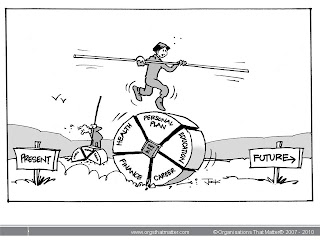A consistent challenge that people face creating their first plan for personal success is defining the future that they desire in terms of strategies rather than what they act actually want.
A common example relates to fitness and health. People will often say things like, “I want to lose 10 kilograms, this is the fitness and health future that I desire.”
Losing 10 kilograms is a strategic goal and while losing 10 kilograms is an outcome, it isn’t what should be focussed upon. It is the lifestyle that comes with being 10 kilograms lighter that is the real desired outcome upon which you should be focussed.
It is defining what they really want that people find difficult to do. Understanding why you want to be 10 kilograms lighter and why that is important to you are the keys to understanding what it is you really desire.
Focussing on the types of activities that you want to be able to do and visualising yourself doing them is far more powerful than focussing on a number. Dewitt Jones, acclaimed National Geographic photographer and an expert on the power of vision explains that the big visions in life shouldn’t be too focussed, too tight. Rather, they should be both clear enough, yet loose enough to leave open a thousand possibilities to bring them into reality.
In terms of a whole of life perspective focussing on losing 10 kilograms is too tight a vision. Focussing on being able to play with your children or grandchildren, being able to participate in a hiking holiday, or dance with your friends are loose visions that have a multitude of opportunities to bring them into reality.
Losing weight may be a strategy that is required to enable you to keep the possibilities alive for you to bring your vision into reality. It is at this point that focussing not only on losing weight but on creating a new lifestyle where you can maintain the weight loss becomes critical. At this level of personal planning you become more focussed on your goals and you take specific actions to achieve them. Such as engaging a personal trainer and training four times per week. These are what Dewitt calls ‘tactical visions’ and are more detailed and specific.
How do you know if the future you are focussing on is what you want or is a strategy to achieve what you want?
The easiest way to approach this question is to reflect on the content of your vision once it has been created. You will discover that you have a mixture of statements that reflect both what you want and the strategies regarding your approach to achieve them.
For each statement in your vision statement ask yourself, “Why do I want this? What will this really look like once I have it? What will I be doing when I have this?” and keep asking this question for each answer that you arrive at, possibly up to five times in a row (this is known as the Five Whys Technique).
In a financial context people often suggest they they want to be rich or to have ‘x’ amount of dollars as part of their vision. Once again money is a strategy that enables you to do want you want to be able to do. Asking yourself, “Why do I want this money? What will I be doing with it?” can help to uncover what you really want and makes it so clear that taking the necessary steps to create the wealth you desire (legally, of course!) becomes more and more doable.
Why is it that people initially struggle with this challenge?
Having assisted more than 1,000 people establish their initial OTM Plan for Personal Success™ the facts are that less than 0.1% (that is less than ten) of those people had previously created a detailed or strategic plan plan for themselves. The reality for the vast majority of people is that creating a personal plan is something that they haven’t done before.
Like most things we do for the first time we are usually not very good at it the first time. This can be frustrating for adults because we like to think that we can quickly achieve an expert standard when we perform a new task, even though our experience has taught us that this isn’t really how we learn.
Learning to use iterative cycles when creating your plan for personal success enables you to more quickly establish a personal plan that both clearly articulates what you want and what you are going to do to achieve your vision. This means that you develop the skill to continually ask yourself, “Why do I want what I have just written? Why is that important to me?”
That said, having an initial plan is more powerful than not having one. David Ingvar’s ‘Memories of the Future’ research highlights the power of having a written plan. In this context having a plan is far more beneficial than not having one at all. If you create you plan and then become disciplined on reviewing it, say once every six to 12 months and also become disciplined at constantly challenging yourself to reflect on why you want what you want, you will, over time create plans that are even more powerful than your first plan. This is normal and part of the learning process that is associated with creating and living your plan for personal success.
Please visit here for more information on the options available for establishing an OTM Plan for Personal Success™.
Gary Ryan enables individuals, teams and organisations to matter.
Visit Gary at http://garyryans.com






